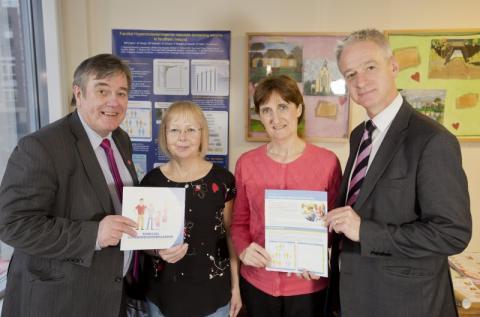New service launched to help families with inherited risk of heart disease

Today the Public Health Agency (PHA) is launching a new service to identify people at risk from a symptomless genetic disorder that increases a person’s chance of early heart disease and premature death.
About one in 500 people has Familial Hypercholesterolaemia (FH), an inherited condition that means their cholesterol levels are higher than normal from birth.
The service has been developed and funded through a partnership between Health and Social Care and Northern Ireland Chest Heart and Stroke (NICHS).
Familial Hypercholesterolaemia is caused by an abnormal gene and, despite it putting people at high risk of early heart disease, most of them don’t even know they have it. If left untreated, around 50% of males will develop heart disease by age 50 and approximately 30% of women by age 60.
Four generations of Frances Willey’s family have witnessed first-hand the devastating effect that the condition can have on a family. However, Frances and her three sons are proof that family testing and treatment can make a difference.
Frances, aged 61, from Belfast was diagnosed with FH in the 1970s following the loss of her mother.
She explains how screening and treatment will help ensure history does not repeat itself in her family: “My grandmother and three of her four children died suddenly of heart attacks in their early 40s and 50s, and my mother was one of them. In 1971, aged only 42, my mother excitedly went out one evening to a dinner dance, but she never came home. The Lipid (cholesterol) Clinic at the Royal Victoria Hospital was just starting so my four siblings and I went along for testing. Out of the five of us, four were diagnosed with FH, including me.
“But unfortunately the devastating effect of FH didn’t stop there. In 1981, aged just 33, my sister had a fatal heart attack, and in 2001 we lost my brother, aged 43, who died from a heart attack whilst playing golf.
“I have now been attending the clinic every six months since 1971 to have my cholesterol levels checked and medications adjusted. I also receive support and encouragement to ‘keep taking the tablets’.
“Due to our family history, all three of my sons were tested for FH when they were toddlers and were all diagnosed with it. They started on medication at aged four and they are now healthy adults and have the same chance of having a heart attack as someone without the FH gene.”
Dr Adrian Mairs, Consultant in Public Health Medicine at the PHA and public health lead for the programme, said: “Northern Ireland is one of the first countries that have an organised system for identifying people with Familial Hypercholesterolaemia. Our aim is to identify everyone with this genetic disorder so that they can get the advice and treatment they need to prevent the early development of cardiovascular disease and premature death. Diagnosis of FH is crucial to the patient’s family too. Any child of an FH sufferer has a 50% chance of inheriting the disease. Once one family member is identified as having it, on average another five will be diagnosed as well.”
This is a regional service that will be delivered locally and has been developed to actively identify all known cases of FH and offer family follow-up testing to their immediate family members. The development of this new service should result in an additional 1,000 people with FH being diagnosed and treated over the first four years of the programme. This will prevent at least 170 cardiovascular deaths.
Moyra Cather, Lead Familial Hypercholesterolaemia Specialist Nurse with Belfast Trust, said: “In Northern Ireland only 25% of people who have FH have already been identified. This means that 75% are currently undiagnosed. This new service sees FH nurses being placed in each trust to actively identify and test relatives, so no matter where relatives live in Northern Ireland, they can be seen by an FH nurse and offered to be tested locally.
“Once identified, FH patients will also be treated locally in specialised cholesterol (lipid) clinics. Research has shown that treatment of FH with cholesterol-lowering drugs is very effective in reducing the risk of heart disease.
“The FH service will be further enhanced by the addition of a new database which will allow the FH team to collect patient information in a much more efficient and effective manner.”
Andrew Dougal, Chief Executive of Northern Ireland Chest, Heart & Stroke, said: “NICHS is delighted that this service is being launched. We have been pressing for this development for some time and have contributed over £35,000 to enable the family follow-up testing service to be set up. This money from our supporters will mean that people with FH can be identified and treated as quickly as possible. Hundreds of lives with be improved and many lives saved across Northern Ireland as a result of their generosity.”
Frances concluded: “FH testing has meant that my sons and future generations of my family will not suffer like I did through losing those closest to you. I would advise anyone who is contacted for FH family testing to go for it. It is not just about themselves – it’s about their children and their children’s children. FH can have a devastating effect on families, but it can be managed if you know about it.”
Ends
